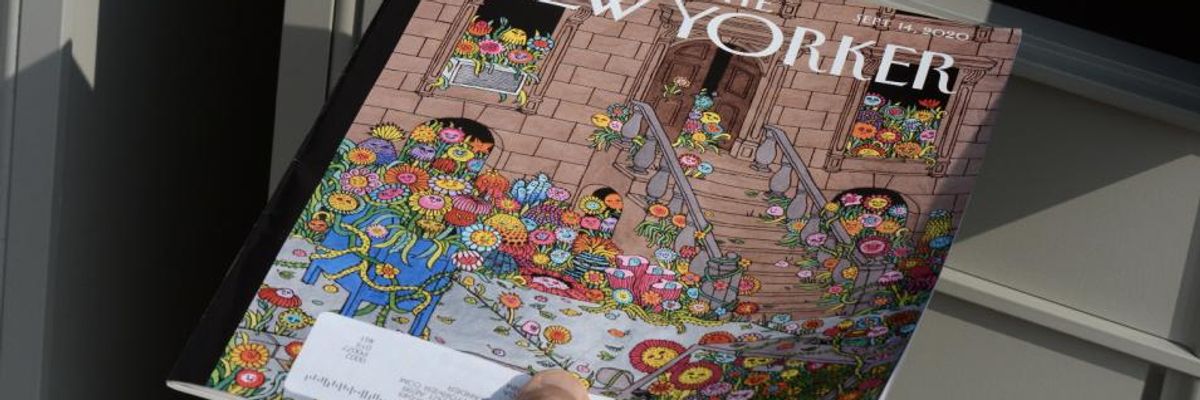A growing number of fellow journalists and progressive lawmakers are expressing solidarity with organized workers at The New Yorker who on Thursday announced a 24-hour work stoppage to protest what the union called "management's egregious wage proposal" in ongoing contract negotiations.
Beginning at 6:00 am Thursday, union members stopped participating "in the production or the promotion of material for the print magazine or the website," the workers explained in a statement. "We are withholding our labor to demand fair wages and a transparent, equitable salary structure, and to protest management's unacceptable response to our wage proposal and their ongoing failure to bargain in good faith."
"#UnionStrong," tweeted Rep. Rashida Tlaib (D-Mich.), linking to the statement. "Get it done. Workers deserve human dignity."
Rep. Jamaal Bowman (D-N.Y.) also made clear he stood with the workers' demand for a living wage, declaring that "one job should be enough, regardless of where you live."
As the union statement detailed:
In November, 2020--after two years of negotiating over many other important contract provisions--the New Yorker Union presented New Yorker and Conde Nast management with a wage proposal that was aspirational but not unrealistic, designed to remedy decades of underpayment and disparities across roles and departments. The proposal included a salary floor of $65,000, which would allow entry-level employees to support themselves in New York City, and a system of graduated annual increases, which would help compensation keep pace with the cost of living and prevent wage stagnation.
We presented this proposal fully ready to negotiate; we did not expect management to automatically agree to it. But the response they offered, on January 12th, was egregious: it included a salary floor of $45,000--only $3,000 more than the lowest current full-time salaries--and an entirely discretionary "merit"-based increase system that would not guarantee any annual salary adjustments. Management also proposed retaining the right to decrease any union member's salary by up to 20% at any time.
The union said that management's proposal "showed disrespect for us and for the work we do," adding that "today's work stoppage is meant to remind The New Yorker and [publisher] Conde Nast of the value of our labor, and to demonstrate our members' solidarity in fighting for a fair contract--which includes fair pay."
"We are committed to The New Yorker, which is why many of us have worked here years--even decades--despite low and stagnant wages. However much we may love our jobs, that love is not enough to live on," the workers stressed, urging management to come to the table next week "ready to bargain in good faith."
The union represents over 100 workers including fact-checkers, web producers, and other editorial employees, union chair Natalie Meade told the New York Times.
In a statement shared with multiple media outlets, a spokesperson for The New Yorker suggested the salary floor may rise in the forthcoming talks:
We've had just two bargaining sessions related to economics: the union delivered a wage proposal at the end of 2020 and, in our first bargaining session of 2021, the company delivered a counter proposal. These were, on both sides, initial offers. It is our hope that, as opposed to resorting to actions like this one, the union will bargain in good faith and return a counter proposal, as is standard in negotiations. That way, we can work together productively to reach a final contract as quickly as possible.
The negotiations come as the media industry struggles with sustainable funding models as well as layoffs, furloughs, and closures tied to the coronavirus pandemic. New York City, where The New Yorker and Conde Nast are based, has been hit particularly hard by the public health crisis.
NYC is also an incredibly expensive place to live. The average apartment size in Manhattan is 702 square feet--and the average cost of rent on the island was $3,790 as of October, according to RENTCafe. Grocery and restaurant prices are also high.
"I loved working at The New Yorker more than I could possibly say, which is I why I stayed for six wonderful years. But it took me years to dig myself out of the credit card debt I took on while I worked there, just so I could live. Solidarity with these incredible workers!" former contributor Kelly Stout tweeted Thursday.
"So many media bosses act as though workers should be grateful just to have the chance to work for a prestigious publication, and expect them to happily accept low wages and poor treatment as a result."
--Kim Kelly, journalist
"I want to add that I was ridiculously lucky to have mentors and friends at the magazine who were deeply kind to me and who raised up my career in ways I could never have dreamed," said Stout. "This isn't about not being grateful, it's not even about me. It's really just about paying rent."
Other journalists also expressed support for the union's demands.
"So many media bosses act as though workers should be grateful just to have the chance to work for a prestigious publication, and expect them to happily accept low wages and poor treatment as a result," said labor writer Kim Kelly. "Fuck that."
Sarah Jones of New York Magazine tweeted that "low-starting salaries are one of the principal reasons our field tends to resemble a playground for the wealthy." She called Conde Nast's wage offer "shameful" and said that she stands "in total solidarity" with the union.
Discourse Blog editor and co-owner Jack Mirkinson, formerly of Splinter (RIP), noted that "unions do not do work stoppages on a whim--it is a very serious decision that comes when trust has completely broken down." Based on the union's statement, he added, "it's clear why the New Yorker Union has lost all faith in management."
This post has been updated with additional details about union membership.




